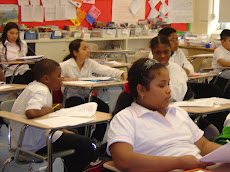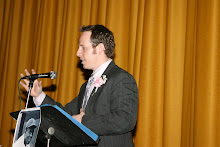March 31, 2008
The conference I attended this week took a deep look at community and explored ways on how to get more people to participate in the growth of a school. We also delve into using specific protocols to investigate real issues that exist at schools. It reminded me why protocol is the number one component in successful meetings. It gives everyone a voice and maintains a focus on the topic at hand. There are so many different types in that they can formulate a direction an investigation is going or they can ask the difficult questions people have a tendency to avoid. Both are important in bringing the conversation to another level. True solutions are hardly ever found when the conversation is superficial. Protocol is great for people who want to unload their problems on other people. In other words, they are the complainer of a group. It forces the person to look within themselves to find answers.
When I was an intern at a school before I became a principal, I was given the responsibility of monitoring both lunches in a high school in the Bronx. This is a prime example of when positional power means nothing. The principal treated me like an assistant principal and many students thought of me as one as well. During my lunch duty, as they were exiting the cafeteria to go to the next period class a student went over and smacked another student in the back of the head. I told the aggressor to stop so I could talk to him. He refused and he continued on like I was no one (Can you believe that?!?!). I was blown away. How could a student tell me “no”? He was basically questioning who I was. Better yet, he didn’t care who I was. I announced my title but that didn’t really seem to faze him too much.
I remember feeling powerless. I brought this pain back to other interns. I was frustrated because I wanted to be respected but I only looked at myself as an intern. We used protocol to investigate my issue. “How can I make a difference if I am only an intern?” They listened to my story during lunch duty which I had associated with a couple of other examples. After, they asked me questions to clarify the situation so they understood where I stood. Here is where I was confined by the protocol. The next step was for them to discuss the issue in front of me without me responding. I felt very confined. My urgency was to contest everything that was said. Basically, in reflection, I had an excuse for everything they were exploring to help me solve my problem. The difference was, I was not allowed to interrupt their flow of thinking. I was forced to listen. Believe me when I say it was an inner battle that I almost lost but I stuck to the protocol because that is what I agreed to do. After, they asked probing questions to dig deeper into the possibilities they were developing. This forced me to explore whether I had really exhausted my options like I had convinced myself that I had done. I found I was responding by answering with “I had not really thought about that” or “maybe that’s possible.” I went from frustrated to annoyed to bewildered. I came to realize that I had painted myself into a corner of frustration. There were options out there but I was closing my eyes to these potential solutions because I was bitter about my situation.
By the time I was done, I was ready to go back to my school. I was a little skeptical about whether our answers were going to work but I did develop hope that maybe these ideas could work. The funny part, in reflection, was the list we came up seemed very simple. It was up to me to see if they were going to work. The list consisted of following the student to class and getting a name, calling home to speak to the parents, speaking to the student in a calm tone (I happen to try the voice of authority), and the most important item was follow through. I attempted to confront the student, he responded in a negative way, and I accepted those circumstances as that is what will continue to happen since I was an intern. The protocol made me realize that I allowed the student to reshape my expectation and made me feel like my title was holding me back from accomplishing my goal. In that situation, I was a complainer. Can’t say it was the first time or the last time but I was forced to be an initiator rather than a recipient of circumstances which I had convinced myself I was unable to change. It was a learning experience because it made me realize how valuable colleagues are and it made me appreciate the use of protocols.
As I reflect about the progress of our school, we have put protocol in certain places but we have not put it in enough places. When issues came up in the past that could be solved by the individual sharing them, we quickly tried to put an idea together which was only a temporary solution. We did not explore what was within our own power to change it. As a leader, I should have been pushing these conversations. They have such an impact on the people and their environment. Powerful protocols will make you ask yourself questions you subconsciously tend to ignore because of the challenge they pose. It also pushes people to go deeper into the topic because questions are developed by the people around you. For the people who participate in the Disciplinary Committee can attest to how much is done during a meeting compared to other groups. We put several steps into each session which we thought were very important components to being a productive group. For instance, a facilitator, time keeper, and recorder are present at each meeting. Small little jobs but very important to staying on task, avoiding disruptions of running out of time, and a continuation is made because last steps are recorded and built upon. They also end each meeting with a share out of how everyone is feeling and concerns are put out on the table. If we look at the many groups and meetings that have been developed in the past, why is the discipline committee the longest lasting and the most influential in our school? Protocol is a necessary piece to productivity.
I will continue to explore ways where we can make our meetings more meaningful. I think adding stronger protocol is one of the answers we are looking for. I know people want the time to be more productive which I truly appreciate that yearning. With a formatted conversation forcing us to look for solutions within ourselves and our community, I don’t see failure coming into the picture. I have said it many times. I know we have the answers within us. Protocol will help us bring them out.
Community
Our Parents continue to come together to plan events. Up and coming are our Awards Ceremony and Parent Appreciation Night for the 6th and 7th grade on April 3rd, 2008 at 6pm. An 8th grade Town Hall is set for the parents at 5:30 pm on April 10th, 2008 and a School dance is set for that night as well. If an 8th grader brings their parent they get into the dance for free. Please have 6th and 7th grade students continue to practice/put together their appreciation piece for their parents. Teachers see Ms. Negron for supplies and blank awards today.
May your preparations meet your vision, your colleagues provide information, and no risk blind you from your mission. Have a great week….
Birthdays:
Cheryl White-Grier - March 17th Garrett Kyle - March 26th
Daniel Foley - March 17th Emmanuel Okon - April 1st
Quote of the Week
“The important thing is not to stop questioning. Curiosity has its own reason for existing. One cannot help but be in awe when he contemplates the mysteries of eternity, of life, of the marvelous structure of reality. It is enough if one tries merely to comprehend a little of this mystery every day. Never lose a holy curiosity. “
--Albert Einstein
Monday, March 31, 2008
Subscribe to:
Post Comments (Atom)





No comments:
Post a Comment